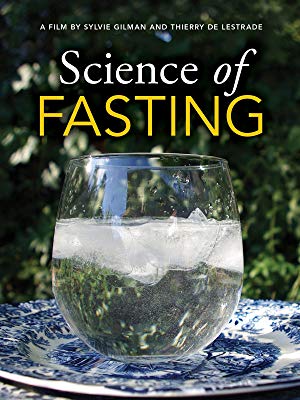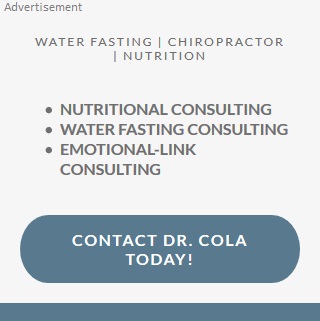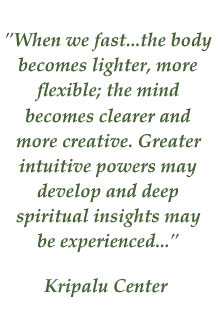Water Fasting
For the greatest therapeutic effect.
Water fasting offers the quickest detox and strongest therapeutic effect. It is also the most challenging fast to perform in the first few days. Careful preparation in the days before a water fast can make all the difference in your level of comfort, but the emotional challenge will still be great.
Getting professional
supervision is an option and is recommended for a water fast longer than 3 days. See the
Who Can Fast page to make sure you meet the
criteria necessary for fasting as well as Know the Precautions to Fasting to familiarize yourself with those concepts.
A true water fast maintains a zero caloric intake. This means water only, nothing added to it. Some call water fasting the only "true" fast and believe that any food allowed into the bodily system prevents the complete resting state desired, compromising the level of cleansing and detox attained. While it is true that water fasting is the most intense path to detoxification and therapeutic benefit, other types of fasting, and even cleansing diets, detox and heal as well. What differs is the intensity and speed of the experience.
Water fasting isn't for everyone, nor is it appropriate at all times. The more toxic your body is, the more intense your discomfort will be in those early days if you haven't properly prepared. It can be difficult to continue on your own if the symptoms have become frightening.
The speed at which old conditions can right themselves during a water fast is incredible. It's amazing the little health "issues" that just go away--the mole that just drops off, the shoulder that's been achy for years suddenly feels well again, that little patch of "weird" skin you've grown accustomed to vanishes without a trace...and those are just the little things. Fasting can even alleviate some "big" things, but if you have major health conditions, you may benefit from having professional supervision.

Water fasters are advised to consume one to two quarts per day of the purest water available or to use distilled water. (While distilled water is not good for everyday consumption, it is good during a fast for its increased ability to bind to toxins.) The first few days of a fast are the most difficult. Besides the emotional challenge of going without food, these first days may have the most intense and uncomfortable symptoms of detoxification. After that, the body adjusts to the new fasting state, and most individuals feel little further discomfort, even hunger disappears.
After 2-3 days, the body goes into a state called ketosis, where it begins to fuel itself internally by burning fat cells. Ketosis occurs around 48 hours for women and 72 hours for men according to Dr. Joel Fuhrman, author of Fasting and Eating for Health. The length of time one can safely operate in ketosis varies from person to person. When hunger returns, often called "true hunger", it will be an unmistakable call of the body for nourishment, and is a signal to end the fast.
Educate yourself on water fasting

"The Science of Fasting" is a documentary created in 2016 which covers the studies done in Russia, the Buchinger Clinic in Germany, the study of penguins who routinely fast for 3-4 months at a time, and a California biologist studying the effects of fasting on rats. It could be a little dry for some, but has lots of excellent information. It is available on Amazon.com for online streaming. If you're thinking about fasting, it's well worth $1.99 to check it out. (Click on More Purchase Options for the $1.99 price.)
The one line that sticks with me the most, and I'm paraphrasing, "Animals and humans seem to adapt better to a lack of food than to an over-abundance of food."
Considering a supervised fast
If you're fasting to alleviate serious conditions and diseases, you should consider a supervised water fast. Water fasting can be dangerous, and I repeat, can be, but isn't usually. According to Fuhrman, the most frequent serious problem comes from sustaining an injury from passing out because you got up too quickly. But there are also tests that can be done before fasting to be sure you don't have any physical issues that could complicate a fast.
Another reason to seek supervision is if you are extremely overweight and are wanting to fast to lose weight. Obesity presents its own unique challenges in what are likely more severe eating patterns and addictions. Emotional issues are highly intertwined with attitudes about food. One must be careful to not support a behavior that could lead to an eating disorder, but to promote a healthy lifestyle that can be maintained long-term.
How to find someone to supervise your water fast
Even if you don't have any particular health issues that complicate a fast, it's never a bad idea to get fasting supervision, especially if it's your first fast. Having an expert oversee the process will alleviate any lingering fears and uncertainties about it. Those who professionally supervise fasts are familiar with a variety of health issues and how they respond to the fasting process, so they can offer you procedures and practices suited especially to your needs. They can also advise you if, in fact, fasting is not advisable for you.
Most fasting supervision practitioners will require you travel to their clinics or retreats, but a select few offer this service via phone or Skype while you fast in the comfort of your own home. Depending on your medical condition, they may require you visit with your regular local doctor at some point before or during the fast.
Dr. Colafranceschi is a practitioner who offers water fasting supervision. He is an advertiser on this site (see his ad to the right) and I have talked to him at great length about his practice. See here for more information on Dr. Cola I put together after our talk so you can gauge if he might be a good fit for your needs.
Another option is to talk to your own doctor and see if s/he would be willing to oversee your health during a water fast, but keep in mind that s/he may not be as familiar with the situations, both physical and emotional, that are unique to fasting. You would need to do quite a bit of your own homework, maybe even provide your doctor with a copy of Dr. Fuhrman's book.
Going it alone
While professional supervision may be the ideal method for a water fast, especially a longer one, many individuals are successful with self-supervision. A rational approach coupled with your intuitional knowledge of your body can be sufficient to stay out of danger.
Don't bite off too much at once. Don't start with a 10-day water fast, tomorrow, if you've never fasted before. Start with short, one day easier fasts, like fruit or brown rice. Or start with intermittent fasting, like "unto the 9th hour" or one meal a day plans. If your eating habits have been really poor, you may want to do a cleansing diet for a week or two, or even a month or more if you feel you may be very toxic.
After you've prepared yourself with these other methods and gained some experience and knowledge about what it takes to fast, you can try occasional one-day water fasts. (Fast no more often than one day per week.)
All of these shorter excursions will be very informative and clarifying on your relationship to food--good and bad
(but mostly bad).
Fasting in all forms offers great personal gifts unique to each of us. If you have no desire to do long-term fasts ever in your life, you can stick with shorter fasts and the rewards will deepen over time.
If you're going to water fast on your own, honor the rules about rest and recuperation and attention to increasing bodily awareness. You must slow down. You must honor your body and its needs and messages. You must give every opportunity for this to be a healing experience--on all levels--and you know intuitively what you need to do and what you need to let go of to allow this.
Due to the intense nature of water fasting, it is more important to educate yourself with further reading. Here's information on two recommended books on water fasting.
Fasting is a personal journey--you are not competing with anyone. Your body dictates how long you can safely fast, not your head.
Annmarie Colbin, author of Food and Healing, states her last water fast ended early after just four days. She sets a good example for the rest of us in listening to her own inner guidance and signals, and not pushing herself counter to her best judgment or succumbing to the pressure we feel because others are watching.
Colbin shares another story about a friend on a 28-day fast who wanted to stop at 10 days. This friend allowed her advising doctor to convince her to continue. It was winter in New York and she was holding down regular hours at work. She completed the fast, but became so depleted, she "estimates that it took her two years to undo the damage and feel normal once again."
Trust yourself.
Tools to assist you
Here's a few Amazon products that may assist you during your fast. The tongue cleaner will help rid your mouth of bacteria and should be used at least once a day during a fast. For dry skin brushing during your fast, use a natural bristle brush similar to the one below. And, of course, Dr. Fuhrman's book to help you stay motivated and informed during your fast.
Tips for water fasting:
- Preparation - See the Water Fasting Tips for
Success page, which includes information on preparation and
implementation. Keep in mind that the toughest part of a water fast is
actually
beginning it. But many long term dieters say fasting is easier than
dieting, after the first few days.
- Water - Drink at least one quart of
water per day, some recommend 2 quarts/day. Use the highest quality
available
or distilled. Some water fasters add a slice of lemon to their water,
as it not only imparts a bit of flavor, but it adds beneficial
enzymes and is cleansing in nature. This only contributes a couple of
calories.
- Weight loss - Weight comes off quickly at first, mostly water weight, then weight loss tapers off. After the fast, you will
put water weight back on just as quickly.
Taking into account this water weight fluctuation, the average sustained weight loss from longer term fasts is one pound per day. See Fasting to Lose Weight for more information.
And for insight into the changes fasting creates around our weight, see Using Fasting for Weight Loss. - Rest - It is important to
allow plenty of opportunity for rest, both physical and emotional.
Reading is an ideal activity especially if the
material is uplifting in nature. Give yourself permission to nap if
ever you feel the need. Stay in bed all day if that's what feels right. It is best to avoid emotionally upsetting
circumstances
when possible, so choose the timing of your fast to avoid known events that could be triggering.
Some people need to slow down and rest more than others during a water fast; some actually should not drive a car, while for others, it is fine. Usually, overweight individuals feel more energetic during a water fast, while thinner individuals will usually feel more tired as their body seeks to conserve energy.
Light exercise, such as walking or yoga or stretching, may be fine, and it may be too much. Be willing to listen to your body's messages and follow through accordingly. - Detox - Start practicing dry skin brushing and
breathing exercises
to enhance the body's ability to
detox through both the skin and the lungs. These are big organs for detox.
As cleansing of the body progresses, there develops a natural aversion to unhealthful substances--not just inferior foods, but also alcohol and tobacco. - Colon health - Contrary to popular belief, enemas are not necessary during a fast. The bowels can take care of themselves, and it
is ok to not have a bowel movement during a fast. Both Dr. Joel Fuhrman and Herbert Shelton, who each fasted thousands
of individuals, recommend leaving the bowels alone.
What can be helpful, however, is taking some sort of natural laxative both before and after the actual fast. Psyllium is excellent for this. The best colon cleanse recipe utilizing psyllium can be found here.
And other methods of fasting colon cleansing can be found here. There are over-the-counter suppositories available, as well, to facilitate the first bowel movement. - Breaking the fast - Coming off a water fast requires the utmost care. Begin with small pieces of juicy
fruit, such as watermelon, every 2 hours. The length of the fast performed will dictate how many days you take to re-acclimate
your body to regular eating. See Guidelines to Breaking a Fast for more
information. Also, check this out, where a reader shares how NOT to break a fast.
- After the fast - Pay attention to the subtle signals from your body as they can guide you to the
foods most appropriate for your needs. Check out the New Food Choices Section
of this site for information.
You may also like
How long should you fast? Discover what length of time is best for you and how much preparation is required.
Health Conditions Improved by Fasting. See the long list of ailments that are known to respond well to fasting.
How to use Cleansing Diets as a partial fast or as preparation for other types of fasting.
Emotional Benefits of Fasting offers insight on the healing effects fasting has on our emotional and mental patterns.
Understanding What Fasting Is and Is Not will dispel any doubts about fasting being akin to starvation.
Recent Posts
-
Valter Longo and the Longevity Diet
Valter Longo's Longevity Diet, which is a fasting mimicking diet, is showing great promise as a prescribed therapy. If you haven't heard of Valter Longo, check out his newly launched website to follow… -
Fasting Overview for Beginners
Information on fasting especially geared toward the beginner. Important guidelines on fasting including the contraindications and how to do a simple one-day fast. -
Meat vs. Vegan | AllAboutFasting
Confusion seems to arise as to whether this site promotes meat-eating or veganism. Let's set the record straight and talk about ideal diets. Ideal for whom? Each of us individually.

